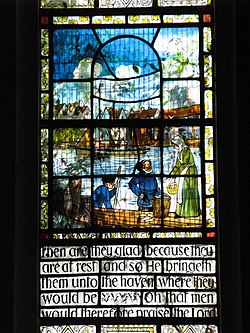Psalm 107
| Psalm 107 | |
|---|---|

Psalm 107:30-31 quoted in the window of St. Margaret's Church, Barking Abbey
|
|
| Book | Book of Psalms |
| Bible part | Old Testament |
| Order in the Bible part | 19 |
| Category | Ketuvim |
Psalm 107 (Greek numbering: 106) is a psalm in the biblical book of Psalms. Written by King David, this psalm is a song of thanksgiving to God, who has been merciful to his people and gathered all who were lost. It is beloved of mariners due to its reference to ships and the sea (v. 23).
Psalm 107 is divided into forty-three verses and is one of the longer psalms in the Bible. In the Revised Standard Version (RSV), it is split into seven sections, each section having a related but distinct theme. The first section, the shortest, comprises verses one to three; the second, verses four to nine; the third, verses ten to sixteen; the fourth, verses seventeen to twenty-two; the fifth, verses twenty-three to thirty-two; the sixth, verses thirty-three to thirty-eight; and the seventh and final, verses thirty-nine to forty-three. An interesting feature of Psalm 107 commonly found in the poetic books of the Bible is its overall regularity. The line lengths are different, but the size of the original sectional divisions is pleasingly even. The theme of the psalm moves forward from section to section.
Overall, psalm 107 is considered one of Israel’s historical psalms, along with Psalm 106 and many of the royal psalms, among others. The overall outline of the historical psalms is to tell a story of a God who accomplishes “wonderful works” (v. 8), although the Israelites, His chosen people, have proved faithless. In fact, acts of infidelity often seem to correspond to an eventual awe-inspiring work of mercy from the Lord. Although the exact timing of the writing of psalm 107 is unsure, it was most likely written during a time of increased union among the Jewish people during the reign of King David (1010-970 BC). The psalm also includes several more specific themes which emphasize the general tone of praise and thanksgiving for the God of Israel.
In the introduction, the first section of psalm 107, the Lord is said to gather “the redeemed ... from the east and from the west, from the north and from the south” (v. 2, 3). Following this, the next four sections address individuals who “wandered in desert wastes,” “sat in darkness and gloom,” “were sick through their sinful ways,” and “went down to the sea in ships” (v. 4, 10, 17, 23). Each of these locational descriptors corresponds to a cardinal direction as mentioned in the third verse of the psalm. The desert wastes mentioned in the second section of the psalm seem to indicate a “great, eastern desert” that might be beat down upon by the sun, which rises in the east. Likewise, in the opposing, western direction, where the sun sets, the Israelites are said to sit “in darkness and gloom” (v. 10). The correlation depicted in this section between darkness and helplessness - apart from the aid of the Lord - harkens back to Old Testament descriptions of Abraham (Gen. 15:12). Throughout early Hebrew history, north was thought to be the direction most associated with evil and iniquity, thus adding emphasis to the direction of north’s correspondence to the fourth stanza, beginning with “some were sick through their sinful ways, and because of their iniquities suffered affliction” (v. 17). And finally, in the orientation of the region that Israel occupied at the time of Psalm 107, to the south lay the sea, directly paralleling the beginning of the fifth section, “some went down to the sea in ships” (v. 23).
...
Wikipedia
